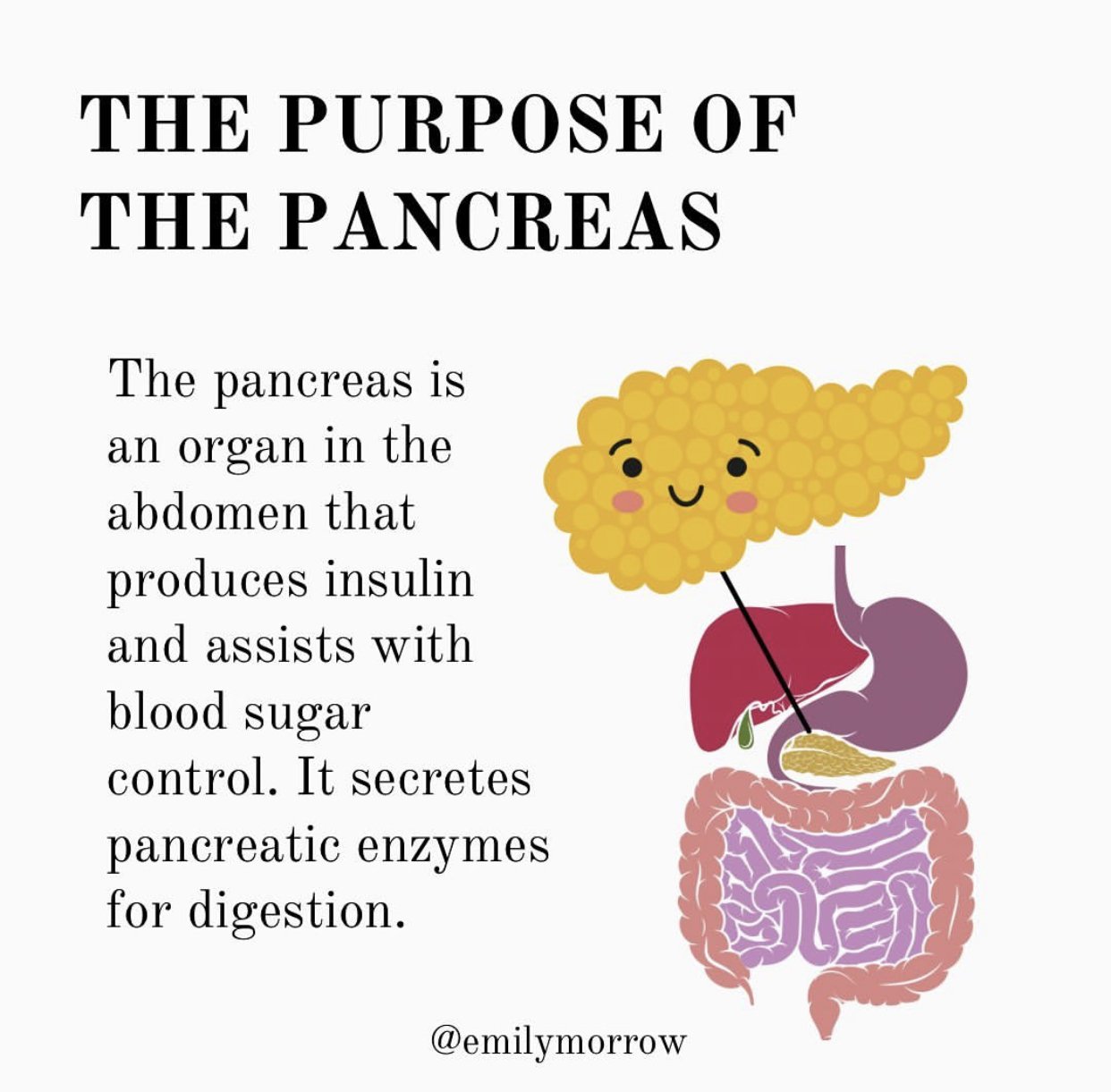The Pancreas: Roles, Signs of Dysfunction & Support
The pancreas produces insulin and assists with blood sugar control. It also secretes pancreatic enzymes for digestion. Stress, whether that be mental/emotional stress or physical stress stemming from infections, glyphosate, EMF, mold, toxins, a poor diet, over-exercising or living a sedentary lifestyle, extreme fasting or under-eating, lack of sleep or rest, blue light, etc. will increase cortisol. When this happens, blood sugar goes up with it, forcing the pancreas to work harder to secrete enough insulin to balance and lower the blood sugar back into normal range. This cycle of overworking the pancreas eventually will lead to insulin issues, insulin resistance and eventually diabetes.
The Purpose of The Pancreas
The pancreas produces insulin and assists with blood sugar control. It also secretes pancreatic enzymes for digestion. The pancreas has 2 glands, the exocrine glands and the endocrine glands.
Exocrine Glands— these glands secrete digestive enzymes into a network of ducts that join the main pancreatic duct to help digest foods
Endocrine Glands— these glands consist of the islets of Langerhans, which secrete hormones like insulin and glucagon into the bloodstream to regulate the level of glucose in the blood, and somatostatin, which prevents the release of insulin and glucagon
Both of these pancreatic glands matter when it comes to balancing the systems in our body.
You can make a case for a number of reasons and causes for pancreas issues, but we will discuss some of the key offenders and burdens to the organ below.
Signs of Pancreas Issue
Abdominal pain
Back pain
Nausea
Vomiting
Loss of appetite
Oily/fatty stools
Nutrient Deficiencies (due to lack of enzymes for digestion and absorption)
Blood sugar issues
Causes of Pancreas Issues
Stress, whether that be mental/emotional stress or physical stress stemming from infections, EMF, mold, toxins, a poor diet, over-exercising or living a sedentary lifestyle, extreme fasting or under-eating, lack of sleep or rest, blue light, etc. will increase cortisol. When this happens, blood sugar goes up with it, forcing the pancreas to work harder to secrete enough insulin to balance and lower the blood sugar back into normal range. This cycle of overworking the pancreas eventually will lead to insulin issues, insulin resistance and eventually diabetes. These stressors can also create an immune challenge for the body that may end up causing an immune attack on the pancreas beta cells and leading to the autoimmune disease of type 1 diabetes.
Pancreatitis is the redness and swelling of the pancreas. It can be sudden or chronic. Some common causes include alcohol abuse, toxins, poor drainage and gallstones in the gallbladder. Other causes of pancreatitis include trauma, ischemia, mechanical obstruction, infections, autoimmune, hereditary, and drugs. The blog post on the gallbladder can help connect some dots for you as well. The entire organ system and body is connected.
Let’s look at some of the key pancreas burdens:
Stress— mental/emotional or physical such as EMF and blue light and lack of sleep, as well as stress from the burdens below
“Chronic stress appears as a risk factor to develop pancreatitis by sensitizing the exocrine pancreas through TNF-α, which seems to exert its detrimental effects through different pathways.” - Source
Glyphosate— disrupts pancreatic enzyme function
“Celiac disease is associated with multiple pathologies in the digestive system, including impaired gall bladder function, fatty liver, pancreatitis, and EOE. We have argued here that many of these problems can be traced to impaired CYP function in the liver due to glyphosate exposure, leading to insufficient flow of bile acids through the circular pathway between the liver and the gut.” - Source
The amino acid glycine gets replaced with glyphosate; this matters because glycine plays important roles in cellular signaling to control glucose homeostasis at both central and peripheral sites, and that glycine supplementation increases insulin secretion and improves glucose tolerance. - Source
Viral infections
There are several different viruses that can influence the presence of autoimmune disorders like Type 1 Diabetes. Research has found that individuals with EBV are more susceptible to autoimmune disorders due to the protein produced by EBV, called EBNA2. This protein binds to specific locations along the genome that are associated with different autoimmune disorders, which downstream, can turn certain genes on or off, altering the function of the cell. Changes in cellular functioning is thought to be the reason that people with EBV are more likely to develop autoimmune. However, more research is still needed. - Source
Mold and Mycotoxins
A study reported seeing 5 new type 1 diabetes cases developing in patients heavily exposed to indoor mold in his occupational medicine practice in a single year. - Source
“Certain fungi move from the gut to the pancreas, expand their population more than a thousand-fold, and encourage pancreatic cancer growth.” - Source
Heavy Metals
“Toxic metals-induced oxidative stress directly damage pancreatic islet β-cells.” - Source
“Arsenic poisoning is one of the causes of pancreatitis.” - Source
“Cadmium could affect pancreatic beta cells and glucose metabolism by downregulating glucose transporter-4 (GLUT4) translocation and inducing pancreatic beta cell cytotoxicity with decreased insulin secretion and increased glucose levels.” - Source
Poor diet
“High-fat foods and simple sugars also increase your triglyceride levels. This boosts the amount of fat in your blood and increases your risk for acute pancreatitis. Research also shows that processed meat and red meat increases pancreatic cancer risk.” - Source
Blood sugar handling issues
Insulin is a hormone produced in the pancreas and released when you eat; it helps move glucose obtained from food from the blood into fat tissue, muscles, and liver; if this process is abused, the pancreas gets stressed out; fasting insulin levels should ideally be 1-5 for someone who still has their pancreas
Glucagon is a polypeptide hormone secreted by the alpha cells of the pancreas that increases the blood glucose level by stimulating the liver to change stored glycogen to glucose; It also increases the use of fats and excess amino acids for energy production; too low or too high glucagon poses issues
Inflammation
“Chronic sustained and persistent inflammation leads to a variety of inflammatory disorders, including pancreatitis.” - Source
Pancreas Supports
Reduce stress
Choose high quality ingredients, chew the food well. cherish the food and chill while eating; this all makes a massive difference in digestion
Eat as organic as possible to avoid glyphosate (herbicides and pesticides); antioxidant-rich foods such as dark, leafy vegetables, red berries, blueberries, sweet potatoes, grapes, carrots, walnuts and pomegranates are also beneficial
Avoid excess alcohol; some may need to avoid it entirely until things settle
Work with a practitioner to address gallstones if those are present, which will inherently stress the pancreas
Ozone can help breakdown glyphosate*; glyphosate impedes pancreatic function; more on ozone therapy here
Track blood sugar to stay on top of blood sugar highs and lows and various trends; download our free blood sugar tracking guide
Garlic can be helpful in reducing toxicity of the pancreas*
Herbal Support— licorice, mullein, peony, uva urisi, ginger, schisandra (check with your practitioner or doctor)
King Coffee— normal coffee can be very acidic; king coffee has a patent protected process on removing some of the more harmful acids; it is also known to enhance immune function which is is important for the body*
Amino Acids
Taurine has beneficial effects in cerulein-induced acute pancreatitis*
Glycine has beneficial effects on insulin control*
Pancreas Supportive Supplements
Pancreatin— a mixture of enzymes produced by the exocrine cells of the pancreas and traditionally used to supplement the body’s own pancreatic secretions; look for a high supplement with strict testing standards and no added fillers or weird ingredients
Pancreatic Enzymes— Amylase, Lipase & Protease (based on individual needs/labs)
Additional Supports
Support for root causes that may be stressing the body and other organs, such as parasites and viral loads and deficiencies; this is bio-individual based on your own makeup and labs
*A Doctor's advice should be sought before using any supplemental dietary product. These statements have not been evaluated by the FDA. These products and educational information is not intended to diagnose, treat, cure or prevent any disease.
A note on supplements: please do not buy just any supplements; please ensure they are good quality, preferably from an online dispensary or specialty grocery store.
References & Further Reading:
The Pancreas and Its Functions
Acute pancreatitis: The stress factor
Adverse Health Effects of Indoor Molds
Heavy metals, islet function and diabetes development
Current Understanding of the Relationship between Metal Exposures and Risk of Type 2 Diabetes
Epstein-Barr virus and autoimmune diseases
Epstein-Barr virus protein can “switch on” risk genes for autoimmune diseases
Glyphosate, pathways to modern diseases II: Celiac sprue and gluten intolerance











